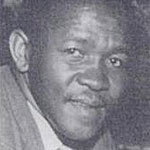This Day in History: December 20, 1965
Additional Date: December 20, 1965
Arthur Elias Letele was born in Lesotho in 1916, but grew up in Ladybrand in the Free State. After completing secondary school in the Eastern Cape, he studied medicine and started a practice in Lovedale in 1947. While at medical school, Letele became active in politics. He joined the African National Congress Youth League (ANCYL), as well as the local ANC branch when he moved to Kimberley in 1948. When the Defiance Campaign started in 1952, Letele persuaded a number of volunteers to defy apartheid laws, and this led to his first arrest. Later in the same year, Letele was arrested again for allegedly inciting violence. He was given a nine month sentence and was prohibited from leaving the Kimberley area until August 1953. Letele was elected to the ANC Executive Committee and was also part of the Congress of the People Campaign. In 1956, he was one of the accused in the Treason Trial but was released when the charges against him were withdrawn. Following the Sharpeville Massacre and the First State of Emergency, Letele was arrested for a third time. Upon his release, he was given 30 days to leave South Africa. He returned to Lesotho in 1961 and continued his involvement with the ANC while in exile. After being diagnosed with an incurable disease and suffering from it for a number of years, Letele committed suicide on 20 December 1965. The South African Institute of Health Care Matters was named in his honor in 2003.
